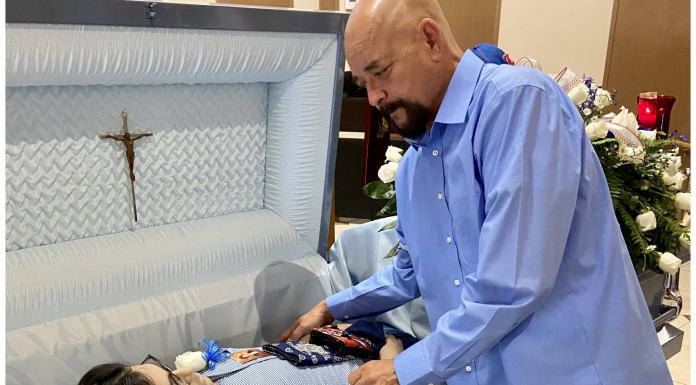(Jon Miltimore, At his funeral, Ernesto Ramirez Jr. wore a light blue suit and the eyeglasses he had worn in so many photographs he’d taken with friends and family during his young life.
The 16 year-old was laid to rest in April when he became one of the hundreds of thousands of Americans claimed by unnatural death during the COVID-19 pandemic, leaving his family in shock.
Ernesto’s father looked down on his child one final time that spring day. Wearing a blue button-down shirt, he said farewell to his son, who lay in a casket adorned with a crucifix.
My good byes to my Baby Boy ??? pic.twitter.com/TQsbhG3aqp
— Ernest Ramirez (@rgvrunner01) September 14, 2021
“My good byes to my Baby Boy,” a grieving Ernest Ramirez said in a recent tweet of those final moments.
Ernesto Ramirez Jr. was one of hundreds of American children taken too early during the COVID-19 pandemic. Only, his life wasn’t claimed by COVID-19.
His father and media reports say Ernesto died five days after taking a vaccine that was supposed to protect him.
Two months after Ernesto’s death, the Centers for Disease Control and Prevention (CDC) announced that atypical levels of heart inflammation had been observed in some patients following COVID-19 vaccination, particularly in young men receiving a second dose of a mRNA vaccine.
…
“My son received the vaccine and he died a few days later, and the only explanation that was given to me was an enlarged heart,” Ramirez told Life Site News earlier this year.
Ramirez told former Fox 26 Houston journalist Ivory Hecker that he was told the vaccine was one hundred percent safe and effective, which is why he allowed his son to get the shot.
“I kept hearing more advertisements about how it was safe for the teenagers, so I said ‘OK,’” Ramirez told Hecker. “Two or three weeks later the CDC started announcing children were having enlarged hearts.”
Enlarged hearts can be a symptom of myocarditis, the Myocarditis Foundation says, which is caused by inflammation that weakens the heart, causes swelling, and creates scar tissue that forces the heart to work harder.
Ramirez said his son played baseball and was in good health, but an autopsy revealed his son’s heart was abnormally large—about double that of a teenager his age.
“A typical heart for a boy this age would be less than 250 grams,” said Dr. Peter McCullough, a Dallas physician featured in Hecker’s video. “In this case it was more than 500 grams.”
Ramirez said he believes claims that the vaccines are perfectly safe are simply not true.
“I love the hell out of my country but I do not trust my government anymore,” he said in an interview this year.
Data show the vaccines have been effective at reducing the risk of severe COVID-19 symptoms. CDC data released last month show people who have been vaccinated are 27 times less likely to be hospitalized with COVID-19. Two states with among the lowest fully-vaccinated rates in the US—Mississippi (41%) and Louisiana (44%)—have seen their COVID mortality rates rise to the highest and third-highest in the country, surpassing New Jersey and New York, respectively.
Though clearly effective—vaccinated individuals are more likely to die from a bee sting than COVID-19, evidence suggests—it is untrue to say vaccines carry no risks. Deaths attributed to vaccination are rare, but they do exist, though these deaths often receive little coverage.
…
Following the death of his son, Ramirez decided to raise awareness around the issue. So he launched a GoFundMe page—but soon found his page deleted for “prohibited conduct” and his donations forfeited.
Ernest Ramirez may simply want to share his son’s story, but the message he wishes to share is a problematic one, for many.
With many still living in fear of COVID-19—even healthy and fully-vaccinated individuals—many view any information that would lend support to the vaccine hesitant as immoral. For this reason, many celebrated when campaigns were launched by Twitter, Facebook, and YouTube to crackdown on vaccine misinformation.
YouTube alone removed some 800,000 pieces of content “that were misaligned in terms of science,” and the effort eventually resulted in some prominent voices, such a former New York Times reporter Alex Berenson—a vaccine skeptic—being banned on Twitter.



